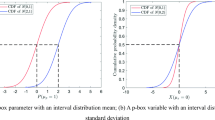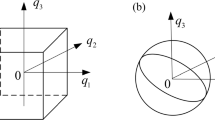Abstract
Reliability-based design and optimization (RBDO) is increasingly critical for high-quality products. However, existing methods, such as active learning Kriging (ALK) and sequential optimization and reliability assessment (SORA), encounter challenges in efficiently and accurately handling complex nonlinear probabilistic constraints. This paper introduces a strategy for ALK called parallel adaptive candidate region (PACR), which leverages clustering methods (K-means or DBSCAN) inspired by machine learning. The novelty is that this method incorporates advanced techniques for RBDO, including quasi-sequence importance sampling (SIS) with a Markov chain based on quasi-samples obtained by ALK model. Another novelty is that a new learning function for reliability constraints, known as the influence factor function with a limit state constraints g(x) = 0 (IFG), has been used to simplify the calculation loop. The efficiency of the methods is validated through various mathematical tests. Then, a specific high-fidelity case study for a planetary roller screw mechanism (PRSM) is conducted to discover an optimal high-precision design with a reasonable load distribution under uncertain constraints. With our method, the standard deviation of the load sharing coefficient decreases by 35.90%, from 0.6221 to 0.3988, thereby affirming the effectiveness of our proposed approach in relatively complex nonlinear optimization problems with uncertain constraints.










Similar content being viewed by others
References
Bichon BJ, Eldred MS, Swiler LP, Mahadevan S, McFarland JM (2008) Efficient global reliability analysis for nonlinear implicit performance functions. AIAA J 46(10):2459–2468
Cadini F, Santos F, Zio E (2014) An improved adaptive kriging-based importance technique for sampling multiple failure regions of low probability. Reliab Eng Syst Saf 131:109–117
Chen Z, Qiu H, Gao L, Li P (2013) An optimal shifting vector approach for efficient probabilistic design. Struct Multidisc Optim 47:905–920
Cheng K, Papaioannou I, Lu Z, Zhang X, Wang Y (2023) Rare event estimation with sequential directional importance sampling. Struct Saf 100:102291
Del Moral P, Doucet A, Jasra A (2006) Sequential Monte Carlo samplers. J R Stat Soc B 68(3):411–436
Du X, Chen W (2004) Sequential optimization and reliability assessment method for efficient probabilistic design. J Mech Des 126(2):225–233
Echard B, Gayton N, Lemaire M (2011) AK-MCS: an active learning reliability method combining Kriging and Monte Carlo Simulation. Struct Saf 33(2):145–154
Engel M, Kanjilal O, Papaioannou I, Straub D (2023) Bayesian updating and marginal likelihood estimation by cross entropy based importance sampling. J Comput Phys 473:111746
Ginsbourger D, Le Riche R, Carraro L (2010) Kriging is well-suited to parallelize optimization. In: Computational intelligence in expensive optimization problems. Springer, Berlin, pp 131–162
Jeong S-B, Park G-J (2017) Single loop single vector approach using the conjugate gradient in reliability based design optimization. Struct Multidisc Optim 55:1329–1344
Jiang C, Han S, Ji M, Han X (2015) A new method to solve the structural reliability index based on homotopy analysis. Acta Mech 226(4):1067–1083
Jiao R, Zeng S, Li C, Jiang Y, Jin Y (2019) A complete expected improvement criterion for Gaussian process assisted highly constrained expensive optimization. Inf Sci 471:80–96
Jones DR, Schonlau M, Welch WJ (1998) Efficient global optimization of expensive black-box functions. J Glob Optim 13(4):455–492
Katafygiotis LS, Zuev KM (2008) Geometric insight into the challenges of solving high-dimensional reliability problems. Probab Eng Mech 23(2–3):208–218
Kumar KM, Reddy ARM (2016) A fast DBSCAN clustering algorithm by accelerating neighbor searching using Groups method. Pattern Recognit 58:39–48
Leimeister M, Kolios A (2021) Reliability-based design optimization of a spar-type floating offshore wind turbine support structure. Reliab Eng Syst Saf 213:107666
Ling C, Lu Z (2021) Compound kriging-based importance sampling for reliability analysis of systems with multiple failure modes. Eng Optim 54:1–25
Melchers R, Ahammed M (2004) A fast approximate method for parameter sensitivity estimation in Monte Carlo structural reliability. Comput Struct 82(1):55–61
Meng Z, Zhang D, Li G, Yu B (2019) An importance learning method for non-probabilistic reliability analysis and optimization. Struct Multidisc Optim 59(4):1255–1271
Meng X-J, Zhang L-X, Pan Y, Liu Z-M (2021) Reliability-based multidisciplinary concurrent design optimization method for complex engineering systems. Eng Optim 54(8):1–21
Molga M, Smutnicki C (2005) Test functions for optimization needs 101
Ni P, Li J, Hao H, Yan W, Du X, Zhou H (2020) Reliability analysis and design optimization of nonlinear structures. Reliab Eng Syst Saf 198:106860
Papaioannou I, Papadimitriou C, Straub D (2016) Sequential importance sampling for structural reliability analysis. Struct Saf 62:66–75
Pingjiang F, Lindong G (2004) Adaptive DBSCAN-based algorithm for constellation reconstruction and modulation identification. In: 2004 Asia-Pacific radio science conference, 2004. Proceedings. IEEE
Saraygord Afshari S, Enayatollahi F, Xu X, Liang X (2022) Machine learning-based methods in structural reliability analysis: a review. Reliab Eng Syst Saf 219:108223
Sóbester A, Leary SJ, Keane AJ (2004) A parallel updating scheme for approximating and optimizing high fidelity computer simulations. Struct Multidisc Optim 27(5):371–383
Song L-K, Bai G-C, Li X-Q (2021) A novel metamodeling approach for probabilistic LCF estimation of turbine disk. Eng Fail Anal 120:105074
Torii AJ, Lopez RH, Miguel LFF (2016) A general RBDO decoupling approach for different reliability analysis methods. Struct Multidisc Optim 54:317–332
Wen Z, Pei H, Liu H, Yue Z (2016) A Sequential Kriging reliability analysis method with characteristics of adaptive sampling regions and parallelizability. Reliab Eng Syst Saf 153:170–179
Xiang Z, Chen J, Bao Y, Li H (2020) An active learning method combining deep neural network and weighted sampling for structural reliability analysis. Mech Syst Signal Process 140:106684
Yang X, Liu Y, Gao Y, Zhang Y, Gao Z (2015) An active learning kriging model for hybrid reliability analysis with both random and interval variables. Struct Multidisc Optim 51(5):1003–1016
Yang X, Mi C, Deng D, Liu Y (2019) A system reliability analysis method combining active learning Kriging model with adaptive size of candidate points. Struct Multidisc Optim 60:1–14
Yao Q, Zhang M, Liu Y, Ma S (2021) Multi-objective optimization of planetary roller screw mechanism based on improved mathematical modelling. Tribol Int 161:107095
Youn BD, Choi KK (2004) An investigation of nonlinearity of reliability-based design optimization approaches. J Mech Des 126(3):403–411
Yun W, Lu Z, He P, Dai Y, Feng K (2020) Adaptive subdomain sampling and its adaptive Kriging-based method for reliability and reliability sensitivity analyses. Struct Multidisc Optim 61(3):1107–1121
Zhang X, Wang L, Sørensen JD (2019) REIF: a novel active-learning function toward adaptive Kriging surrogate models for structural reliability analysis. Reliab Eng Syst Saf 185:440–454
Zhang M, Yao Q, Sun S, Li L, Hou X (2020) An efficient strategy for reliability-based multidisciplinary design optimization of twin-web disk with non-probabilistic model. Appl Math Model 82:546–572
Zhang X, Lu Z, Cheng K (2021) AK-DS: an adaptive Kriging-based directional sampling method for reliability analysis. Mech Syst Signal Process 156:107610
Zhang M, Xia S, Li X, Yao Q, Xu Y, Yin Z (2022) Systematic reliability-based multidisciplinary optimization by parallel adaptive importance candidate region. Aerospace 9(5):240
Zhou Y, Lu Z (2020) An enhanced Kriging surrogate modeling technique for high-dimensional problems. Mech Syst Signal Process 140:106687
Zhou J, Li J (2023) IE-AK: a novel adaptive sampling strategy based on information entropy for Kriging in metamodel-based reliability analysis. Reliab Eng Syst Saf 229:108824
Acknowledgements
This work was supported by the National Natural Science Foundation of China (Grant Nos. 12302156 and 52305273), Guangdong Basic and Applied Basic Research Foundation (Grant 2022A1515110636), the Natural Science Basic Research Plan in Shaanxi Province of China (Program No. 2023-JC-QN-0012),National Science and Technology Major Project (J2019-IV-0017-0085).
Author information
Authors and Affiliations
Corresponding author
Ethics declarations
Conflict of interest
The authors declare that they have no known competing financial interests or personal relationships that could have appeared to influence the work reported in this paper.
Replication of results
The data that support the findings of this study are available from the corresponding author upon reasonable request.
Additional information
Responsible Editor: Zhen Hu
Publisher's Note
Springer Nature remains neutral with regard to jurisdictional claims in published maps and institutional affiliations.
Supplementary Information
Below is the link to the electronic supplementary material.
Rights and permissions
Springer Nature or its licensor (e.g. a society or other partner) holds exclusive rights to this article under a publishing agreement with the author(s) or other rightsholder(s); author self-archiving of the accepted manuscript version of this article is solely governed by the terms of such publishing agreement and applicable law.
About this article
Cite this article
Zhang, M., Zhang, Z., Xia, S. et al. An active learning strategy of reliability-based design and optimization by parallel adaptive sequential importance candidate region method. Struct Multidisc Optim 67, 14 (2024). https://doi.org/10.1007/s00158-023-03724-4
Received:
Revised:
Accepted:
Published:
DOI: https://doi.org/10.1007/s00158-023-03724-4




